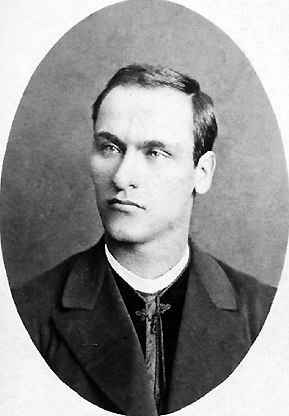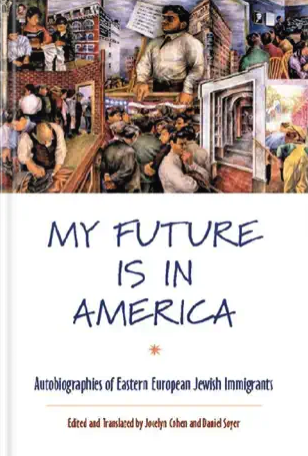[p. 109-114]
Part Two
Immigration to Canada
Polish authorities did not pose any barriers for Ukrainian people wishing to go abroad. When the former soldiers of the Ukrainian army were leaving, the authorities were also happy that they would get rid of the turbulent ‘elements’ who were most actively protesting against its arbitrariness. All sorts of aldermen, scribes, and other officials you could hardly approach without a bribe were happy, too.
I started my efforts from obtaining a permit from the public government. At that time, we had an appointed Polish alderman. By the way, it must be mentioned that the assigned alderman started resembling an old beggar with time, and would roam around the village panhandling. And our merciful peasants, forgiving him all the wrongs that he caused to them during his office, did not refuse to help him. I wonder if the Poles would act the same generous. Never for the world!
Having received permission from the public government, I appealed to the county government — to the “team of document management,” and the county head was also a Pole. The “document management team” did not pose any barriers, so I soon had the necessary papers on my hands. That is when I realized the significance of my decision because earlier everything seemed to me to be somehow uncertain, and I don’t think I believed that I would leave my homeland.
Now, the decision was final. My fate, as the fate of my wife and my little son, was in my hands.
It was only when I was saying goodbye to all my family and friends that I felt how much I loved my village, my church, where my mother took me as a child, my school and my peers I used to study with, and then, we shared the good and bad. I left a couple of beautiful horses under the care of my father and went to the stables to say goodbye to them, like to some faithful friends. I snuggled against the smart heads of the animals, leaning them to my chest, and spoke to them, certain that they could understand me.
Saying goodbye to everyone, I left my home and my native village on April, 23, 1925.
As I walked out of the yard, I was in so much sorrow that I felt like turning back. In fact, even when I was going to war, I did not feel such regret as when I was leaving for the big wide world. But I comforted myself with the idea that I was not leaving forever, that I would soon return, that everything could change for the better, and I would still live a happy life. That was my train of thought; the sadness intertwined with hope; and I, along with the pain and hope for the better, set out on a long journey.
Arriving in Warsaw, we stopped there for a short time to check our passports and arrange other technicalities required for travelers leaving Poland. There, we were surprised to find out the large warnings on the walls and doors: “Beware of the frauds.” This caused an unpleasant impression and fear among travelers because each traveler had a few dozen of dollars on them, which they had to show to Canadian authorities when boarding the ship. Here, it was impossible to know who was a fraud or a friend because those people who warned you to be careful would often follow where you tried to hide your money: whether in your pocket or in your bosom. The Warsaw thieves, in fact, felt quite comfortable. There were cases when they squeezed into a crowd of people and cut out with a razor an entire pocket, along with the wallet. It was the case with the suitcases, too. Putting an eye on some most valuable suitcase, the thief simply grabbed it from the owner’s hands, and fled to the street. And there, they disappeared without trace! They belonged in the street and knew their ways. Hearing the public screaming, “catch the thief”, the policeman ran after them, but without any success, because he himself would often be an accomplice to the crime.
This is how the Polish capital Warsaw looked like, and the entire world saw it because immigrants included not only Ukrainian people but also Poles were leaving overseas, and people from other regions, too, and possibly the nationals of other states. We went there and saw with our own eyes the ways of the “powerful Poland.”
I took a train to go to Danzig, where I boarded the Cunardline ship, and nine days later, I arrived at the Canadian port city of Montreal in Quebec.
We got off the ship, walked along the pier, and enviously watched other travelers who were met by either family or friends from their native lands. But such lucky men were few.
We were accompanied by our ship agents who were supposed to take us to the western provinces in Canada, to work at the farms. In case any of us got lost or delayed deliberately, they had to continue at their own expense and pay one cent per mile, and thus biting off their 25-dollar cash that they had to carry when entering Canada.
Our group of immigrants stopped by the Winnipeg City, and our agents left us there. Each of us was left to our own devices. So, we started walking the streets of the city and looking for some native Ukrainian soul to ask about everything and find out about any job opportunities.
But the large sausage “baloni” that we were given for the trip had been long gone, and I went to a restaurant and asked to give me something to eat — “it”. The pretty waitress who served me asked some details from me but I did not understand a word, I just nodded. The girl brought me a glass of water that I didn’t need at all, and a plate of fish. That was my dinner. But then the waitress understood something and brought her Ukrainian friend. I was very happy to meet a fellow country person, and that for the future I would no longer have difficulties ordering food.
At that time, there were not as many of our people in Canada as now, but men could always be recognized by their long mustache. So, such mustachioed farmers went to the emigration bureau, looking for workers.
One day, an employer came over and ordered twenty people to come along to the city of Kenora, near Winnipeg, to quarry stones for the cement factory. I was lucky to be selected for that group. We were paid 35 cents per hour in Kenora, and that was a lot of money for us. All of us, especially the newcomers, were very happy and tried hard seeking the favour of the employer to keep the job. But in fact, there was no need to try so hard, you just had to be attentive and follow the rules. The most important rule was not to smoke, and that was written on large red warning signs displayed in all places at the quarry. We already knew what the strange words “no smoking” meant, and the smokers did not smoke.
I also once got into trouble where I suffered without any guilt. I went to the toilet, and another man followed me. The toilet was made of wood, and built loosely. The other man lit a cigarette for himself, not realizing that the wind was driving smoke through the cracks, and that it could be seen from afar.
We got out of the toilet, and the supervisor (‘foreman’) met us and handed to us some blue papers and ordered that we go to the bureau. We went along, and they told us that we were fired.
I was very unhappy that such an injustice happened to me, and I could not justify myself because I did not speak English. And then I found out that the supervisor was Ukrainian, so I could talk to him. But it was too late. I was also told that the supervisor hired people when getting a bribe. After all, bribery flourished at other enterprises, because it was difficult to find a job, so various “foremen” made an additional profit from people’s distress.
Summer was approaching, and we learned that at such a time it was easiest to get work on the farm, and it was best to go the province of Saskatchewan. There, farmers needed workers not only for the harvest period but also afterwards, to uproot the forests to expand the arable lands for sowing.
With two other men, I traveled to Saskatchewan. We went on foot because we did not want to spare any money for the trip, and the weather favoured the journey. The roads seemed endless and ran as far as the eye could see, and on both sides, there were huge fields of almost ripe wheat waiting for human hands in some few days to tend to them.
Traveling among these boundless wheat fields, I flew in my thoughts to our native villages, with the tightly divided and redistributed strips of fields that were getting more narrow from generation to generation. How much more will parents have to divide them among their children, and the children — among their children, too?
For some reason, we did not feel much fatigue and rejoiced at the golden expanses of the fields. We looked around to check if some car was going over and could give us a lift, and at the same time we would ask the driver where to find well-paid work. But there were no cars because they were few in those times, unlike today. Instead, people were riding the carts, the same kinds of carts they used to take the grain to elevators in the fall.
That’s how we covered many miles, and we got really tired. So, we sat under a tree in the shade to rest because the bright hot sun of Saskatchewan was scorching mercilessly. We sat down, and then we lay down, stretching out our tired legs. And then, when we were lying like that, we suddenly heard some sounds of music from afar. So, we did not take a long rest but continued our trip. We approached some spacious yard. At the gate, we saw a group of men and women, and the horses harnessed at the carts, under the vast aspen trees.
The men greeted us, they spoke in Ukrainian, and invited us to the wedding. We felt awkward because we didn’t know any of them, and they didn’t know us, and we looked like beggars with those backpacks on, and wearing old dusty clothes. To be true, the hospitable men were not dressed exquisitely, either. But women wore long and wide floral skirts and embroidered aprons, exactly like in our homeland. So we did not feel like joining the wedding in our clothes. But they would not accept ‘no’ for an answer, and kept inviting us so cordially that it was uncomfortable to refuse. So, we came in.




An excerpt from the autobiography of Ukrainian migrant, Vasyl Plaskonis, describes his experience of leaving interwar Poland for Canada in 1925. The motivation for emigration was not only economic, but also political, as Vasyl Plaskonis felt persecuted in Poland as a former participant in the Polish-Ukrainian war. The author considered his decision to migrate as temporary. The text describes the process of making a decision about the departure, journey, and the first months of adaptation in Canada. An important issue is the mediation of agents who helped emigrants to purchase tickets and leave. In Canada, new Ukrainian migrants found work in mines, or as day laborers on farms. The text explains how the network of Ukrainian connections was useful for finding work, housing, or even for resolving everyday issues in Canada.